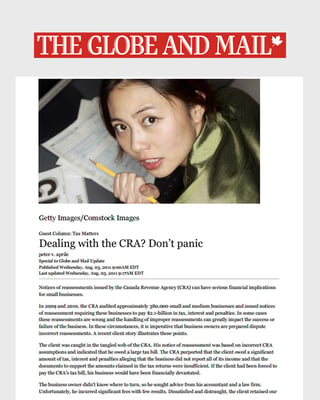
Notices of reassessments issued by the Canada Revenue Agency (CRA) can have serious financial implications for small businesses.
In 2009 and 2010, the CRA audited approximately 380,000 small and medium businesses and issued notices of reassessment requiring these businesses to pay $2.1-billion in tax, interest and penalties. In some cases these reassessments are wrong and the handling of improper reassessments can greatly impact the success or failure of the business. In these circumstances, it is imperative that business owners are prepared dispute incorrect reassessments. A recent client story illustrates these points.
The client was caught in the tangled web of the CRA. His notice of reassessment was based on incorrect CRA assumptions and indicated that he owed a large tax bill. The CRA purported that the client owed a significant amount of tax, interest and penalties alleging that the business did not report all of its income and that the documents to support the amounts claimed in the tax returns were insufficient. If the client had been forced to pay the CRA’s tax bill, his business would have been financially devastated.
The business owner didn’t know where to turn, so he sought advice from his accountant and a law firm. Unfortunately, he incurred significant fees with few results. Dissatisfied and distraught, the client retained our legal firm.
Our firm reached an out-of-court settlement with the CRA on the basis that their audit methodology contained errors and argued that this methodology was insufficient to satisfy the agency’s evidentiary burden of proof. The settlement confirmed that the client had, in fact, reported all income and that the CRA’s methodology was flawed leading to a substantial reduction in tax, interest and the deletion all penalties.
Here are eight things that the client wished he had known before he received the CRA’s notices of reassessment:
1. The CRA doesn’t always get it right.
Taxpayers have the right to pay no more tax, interest and penalties than required by law. If the CRA gets it wrong, taxpayers must challenge the CRA’s interpretation and application of the facts and law to ensure that they are not paying more than their fair share. Notices of reassessments and tax disputes are not necessarily an indication that the taxpayer, or his accounting professional, has done something wrong.
2. Act quickly and with purpose.
Taxpayers must file a notice of objection to dispute a notice of reassessment. The general rule is that a taxpayer must file his or her notice of objection within 90-days of the date that the CRA mailed the notice of reassessment. If the taxpayer does not deliver a proper notice of objection within the 90-day period, he or she may apply for an extension of time to object. The CRA will consider applications for an extension of time to object if the application meets all relevant conditions and if it is filed within one year of the 90-day period. However, the CRA may deny a taxpayer’s application for an extension of time and, therefore, it important to file a proper notice of objection within the 90-day period.
3. It’s on you.
Generally speaking, the normal reassessment period is three years for individual taxpayers and four years for corporate taxpayers. If the CRA issues a notice of (re)assessment within the normal reassessment period, the onus is on the taxpayer to prove that the assessment is wrong in fact and law. Taxpayers should be prepared to present factual and legal support for their position that the reassessment is wrong. If the CRA issues a notice of reassessment outside the normal reassessment period, taxpayers should understand the impact of this shift in the burden of proof and make strategic decisions to take advantage of the shift.
4. The CRA doesn’t make ‘deals.’
The CRA is not motivated to settle tax disputes in the same way as business people. The CRA will not compromise based on the amount in dispute or the cost of litigation or other soft factors. Instead, the CRA believes that tax disputes must be settled on a “principled” basis i.e., the CRA will not agree to settle a dispute unless persuaded that the taxpayer’s position is correct in fact and/or law.
5. Don’t bring a knife to a gun fight.
In most cases, tax disputes are won or lost based on more than accounting or the words written in the Income Tax Act. In addition to knowledge of the relevant legislation, the tax dispute process is governed by the case law, rules of procedure, the onus of proof, the standard of proof and the rules of evidence. In our experience, the party with the greater understanding of the legislation, case law and rules often has a significant advantage.
6. The Taxpayers’ Ombudsman ability to help is limited.
The role of the Taxpayers’ Ombudsman is to review service-related complaints about the CRA that have not been resolved through the CRA’s service related complaint process. Service related complaints include, but are not limited to, CRA employee behaviour and poor information. In these cases, the Taxpayers’ Ombudsman may ‘provide advice to the Minister of National Revenue about service-related matters in the CRA’. The Taxpayers’ Ombudsman does not have the power to review, comment or influence the correctness of any CRA audit, objection, assessment or decision to deny taxpayer relief.
7. Begging should be a last resort.
In our experience, taxpayers too often choose not challenge the merits of the assessment and, instead, simply choose to ask the CRA to waive or cancel interest and penalties under the taxpayer relief provisions (formerly known as the ‘fairness provisions’). The taxpayer relief provisions can apply when a taxpayer has not being able to meet tax obligations due to extraordinary circumstances such as financial hardship, disruptions in service such as a postal strike, an error in a CRA publication, or a disaster such as flood or fire. Although the provisions can be a powerful tool in a taxpayer’s arsenal, it is the tax equivalent to approaching the Minister of National Revenue on bended knee as opposed to disputing the reassessment on substantive basis as a matter of right. In most cases, if a taxpayer has an arguable case the better route is to dispute the reassessment. If the taxpayer is unsuccessful, the provisions may be a valuable final option.
8. Know where to get help.
A very small portion of tax lawyers practice tax dispute resolution and litigation. As discussed, the initial phases of the process move quickly and, therefore, clients often struggle to research and retain the right tax dispute lawyer. We recommend that clients take the time to understand their options in advance or speak to their accounting professional to ensure that s/he knows, or has worked with, a suitable tax dispute lawyer should the need arise.

.jpg?width=120&name=Counter%20Tax%20Litigators%20Logo%20Stacked%20(MidnightBlue%20on%20White).jpg)




.png?width=499&height=299&name=CRA%20Disputes_Management_Board_First_Conversation%20(Sphere%201%20Purple).png)


.png?width=400&height=400&name=CT-How_Can_We_Help-22_july_NewGraphic_b(small).png)